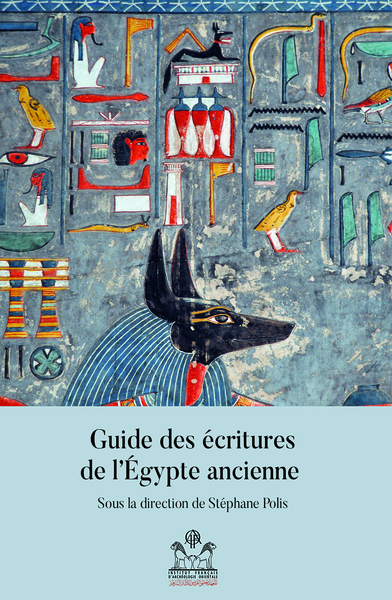- EAN13
- 9782724708363
- Éditeur
- IFAO
- Date de publication
- 12 avril 2022
- Collection
- GUIDES DE L'INS
- Nombre de pages
- 340
- Dimensions
- 22,3 x 14,3 x 2,1 cm
- Poids
- 649 g
- Langue
- fre
Guide Des ÉCritures De L'ÉGypte Ancienne
Stéphane Polis
IFAO
Prix public : 26,00 €
Nombreuses furent les écritures employées en Égypte ancienne. Si les hiéroglyphes se taillent assez évidemment la part du lion, c’est toute la richesse des différentes écritures qui furent utilisées sur la terre des pharaons qui est ici exposée. Deux cents ans après le déchiffrement des hiéroglyphes par Jean-François Champollion, que sait-on des écritures de l’Égypte ancienne ? Ce Guide des écritures répond à la question, en exposant de manière accessible l’état de nos connaissances sur les différentes écritures qui furent utilisées sur la terre des pharaons. Le lecteur y découvrira plus de cinquante notices rédigées par des spécialistes, qui présentent la diversité de leurs manifestations dans le temps et l’espace, en expliquent les grands principes de fonctionnement, et décrivent leurs principaux contextes d’emploi. Le guide propose dans un premier temps un panorama des écritures d’Égypte, depuis l’apparition des hiéroglyphes jusqu’à l’introduction de l’écriture arabe. Il explore ensuite les multiples facettes de l’écriture hiéroglyphique : le nombre de signes et leur classification, la relation entre signes d’écriture et représentations figurées, l’organisation spatiale et la matérialité des hiéroglyphes, l’adossement de l’écriture hiéroglyphique à la langue orale, ainsi que les jeux sur les signes et autres emplois dits énigmatiques. Enfin, il s’intéresse aux principaux usages de l’écrit en Égypte ancienne. Apprentissage de l’écriture, utilisation des supports mobiles et monumentaux, inscription des objets et graffiti, destructions de l’écrit et systèmes de marques sont autant de pratiques envisagées. L’emploi de l’écriture à des fins particulières – administratives, funéraires ou magiques, par exemple – ou dans des contextes socio-historiques spécifiques est également abordé. -- What do we know about the writings of ancient Egypt, two hundred years after Jean-François Champollion deciphered hieroglyphs? This Guide answers the question in an easily accessible format, presenting the current state of knowledge on the different scripts that were used in the Land of Pharaohs. The reader will find more than fifty articles written by specialists, presenting the diversity of scripts in time and space, explaining the main principles of their functioning, and describing the main contexts in which they were used. The guide begins by offering an overview of the scripts of Egypt, from the appearance of hieroglyphs up to the introduction of Arabic writing. It then explores the multiple aspects of hieroglyphic writing: the number of glyphs and their classification, the relationship between written glyphs and figurative representations, the organization in space and the materiality of hieroglyphs, the relationship of hieroglyphic writing to spoken language, as well as the play on symbols and other so-called enigmatic uses. Finally, the guide focuses on the main uses of writing in ancient Egypt. Learning how to write, the use of movable and monumental material, inscriptions on objects and graffiti, the destruction of writing and systems of symbols are all practices that are considered. The use of writing for specific purposes—such as administrative, funerary or magical—or in specific socio-historical contexts is also adressed.


















